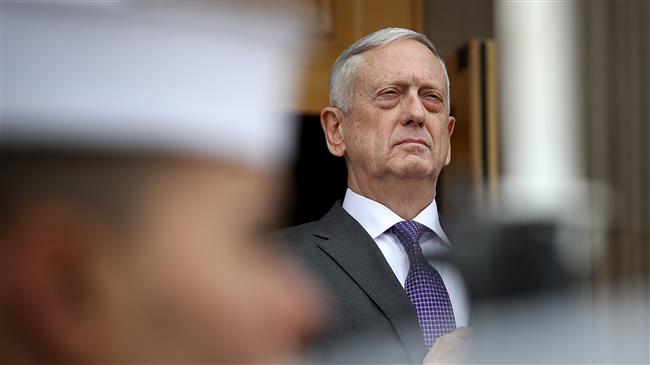Proposed US cruise missile as bargaining chip against Russia: Mattis
US Defense Secretary James Mattis has said that the purpose of Washington’s plan to deploy new low-yield nuclear weapons is to force Russia to respect agreements on limiting nukes.
At a hearing before the US House Armed Services Committee on Tuesday, Mattis said the US plan to add a new sea-launched cruise missile to the country’s nuclear arsenal was meant to serve as negotiating leverage to stop Russia from violating key arms control treaties.
"The idea is, once again, to keep our negotiators negotiating from a position of strength," Mattis said at the hearing on the US administration's Nuclear Posture Review (NPR), a new nuclear arms policy that aims to revamp US nuclear arsenal and develop new low-yield atomic weapons.
The report, published last week, proposed two new nuclear weapons that include a sea-launched cruise missile and a lower-yield version of an existing ballistic missile.
US Defense Secretary said the measure was adopted after Washington accused Moscow of violating a 1987 Intermediate-Range Nuclear Forces (INF) Treaty due to the deployment of a ground-launched cruise missile. Russia has rejected the allegations.
"We have an ongoing issue with Russia's violation of the INF," Mattis said. "I want to make certain that our negotiators have something to negotiate with. I don't think the Russians would be willing to give up something to gain nothing from us.”
"We want Russia back into compliance [with the treaty]. We do not want to forgo the INF. But at the same time, we have options if Russia continues to go down this path," he added.
The new weapons proposed in the NPR would also be a deterrent against Moscow since some of Russian senior officials have promoted the use of low-yield nuclear weapons in a conventional warfare scenario, according to Mattis.
The Russians essentially want to "escalate to victory and then deescalate. We want to make certain they recognize that we can respond in kind. We don't have to go with a high-yield weapon. Thus, the deterrent effort stays primary," the US defense secretary said.
In a harsh response to the move earlier this week, the Russian Foreign Ministry denounced the Washington's new nuclear policy as both "confrontational" and "anti-Russian."
The ministry said in a statement that the NPR would certainly compel Moscow to take into consideration the newly adopted approaches by Washington and to “take necessary steps in order to ensure own security.”
The statement particularly expressed opposition to the development of low-yield nuclear weapons, which Moscow said can significantly lower the threshold for the use of nuclear weapons and "lead to a nuclear-missile war even in low-intensity conflicts."
The Cold War-era arms-control pact of INF covers ground-launched ballistic and cruise missiles and their launchers, with ranges of 500 and 5,500 kilometers.
Without trust-building, talks with US will be futile: Iranian diplomat
Hezbollah slams Israel's abduction of Lebanese group official in raid
Maxwell’s silence in Epstein case sparks claims about White House cover-up
Pezeshkian: Iran not after war; economic pressure meant to tarnish government
Iran’s top security official arrives in Oman amid indirect talks with US
VIDEO | Protests in Italy over US, Israel operatives as winter Olympics get under way
Epstein files fallout: Norwegian police launch corruption probe into veteran diplomat
VIDEO | Iranian embassy in China celebrates Islamic Revolution anniversary











 This makes it easy to access the Press TV website
This makes it easy to access the Press TV website